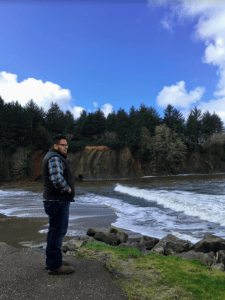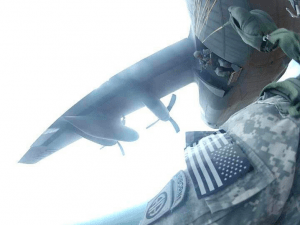Andrea Swiedom Staff Reporter
When sophomore Antonio Cortez, 36, brought his wife to his parent’s house for the first time, she thought his brothers were initiating a spontaneous sleepover after dinner as they pulled out pillows and blankets. Cortez had to explain that was just their bed.
“I grew up sleeping on a living room floor,” Cortez said. There with him were his four brothers in a one bedroom apartment in Anaheim, CA.
In hopes of providing a better future for their children, Cortez’s parents crossed the border from Southern Mexico. “They wanted their American-born children to go to college,” Cortez said.
In 2002, Cortez enrolled in a vocational program in Orange County, CA where he earned an associates degree in mechanical engineering while working full-time as a cement mason. But he always had military service in mind as a back-up plan. By 2004, it became his best option. “Eventually I just got to the point where, we were struggling, we needed health care. It was really the lure of the financial assistance.”
Cortez’s wife was struggling with health problems and the hospital bills were continuously draining their savings. “I made up to 30 bucks an hour, but it seemed like every time we visited the hospital it was a couple thousand dollars,” Cortez said.
To cover the costs of education and healthcare, Cortez worked 60 hour weeks and saw the physical effects that decades of masonry had on those around him. “I saw a guy doing it for 20 years and he was calloused and sunburnt,” Cortez said, scrunching his fingers. “I thought, I don’t know if I want to do this for the rest of my life.”
Cortez’s first step towards military service was complete happenstance. He was running errands with his father one afternoon when their car got a flat tire. While waiting for roadside assistance, Cortez found himself staring into the window of a recruitment office. A recruiter came outside and convinced Cortez to apply and take the Armed Services Vocational Aptitude Battery (ASVAB) test right then and there.
Within a week of the test, Cortez, determined to pursue the most intense level of training, jumped at a last minute opening for a Ranger Airborne spot and left for Army Ranger school.
“They do SERE training which is survival, evasion, resistance and escape and you go through psychological warfare,” he said. “They lock you in a dog kennel, spray you with a hose. . .it’s just seeing how far you can go before you break. You want to be the guy that doesn’t break, but eventually you do.”
Cortez was deployed in Baghdad, Iraq where he manned an old yacht house-turned army base with 12 other American soldiers and 25 Iraqi police. “It had marble floors, a marble staircase and it was all shot up,” he said. “The water was murky brown. It was half mercury and if you ate the fish in the river, you would get jaundice.”
While in Baghdad, he sustained a severe leg injury from a grenade attack while riding in a truck back to the base. He was wounded by what he described as a molten needle that penetrated the three inches of steel and electrical system of the truck before shattering his knee.
“I couldn’t bend my leg; I thought it was gone. I couldn’t feel most of the left side of my body,” Cortez said while gingerly rubbing the side of his left leg.
After eight years of military service, getting shot in the back and jumping out of airplanes, this was ultimately the injury that led to his medical discharge.
“Most of my military career was like, ‘Hey, you’re alive now. Just get through it to get back to hot dogs and Budweiser,’” Cortez said with a straight face.
After his recovery, he spent 30 days in a military out-processing program primarily geared towards retirees and left him with little information as to what benefits and services were available to him as an injured veteran coming straight out of combat.
The lack of information influenced his desire to volunteer with veteran programs to inform others about resources available to them as they transition to civilian life.
“I have spent most of my time since the military trying to figure out how to make up for some crummy things I had to do, not necessarily by choice,” Cortez said.
At UMF, he’s studying rehab management with the ultimate aim to work with veterans dealing with post-combat issues.
Cortez landed in Farmington by happenstance just as he ended up in the military. After leaving the army in 2012, he spent several years soul searching. He worked various jobs in the automotive industry and as a millwright designing and welding custom kitchen suites. Once again, he found himself overworked and burnt out.
With some pension funds and the desire to travel, Cortez, his wife and 12 year old son hit the road in an RV traversing the country three times before ending up at a campsite in Canon, Maine. It only took three months at the seasonal site for the family to realize that Maine was home, and Cortez’s son was ready to attend a public school.
“We love small town life. We just like rural because people want to help you just because they want to help,” Cortez said. “People here are just generally great, and it’s beautiful here.”
He expressed a great appreciation for the UMF campus and the relationships he’s formed with professors due to the open atmosphere and small class sizes.
“Farmington is UMF, and UMF is Farmington. And it’s cool that the public is allowed to use the facilities and the gym,” Cortez said. “It’s really a community.”

